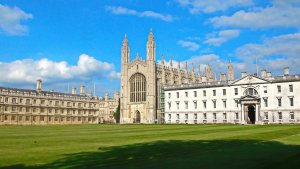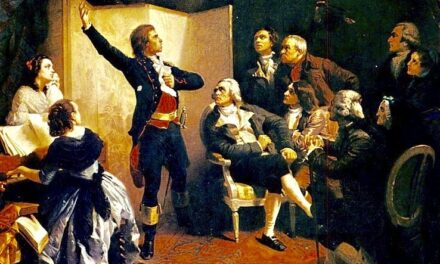We support our Publishers and Content Creators. You can view this story on their website by CLICKING HERE.
Was Albert Jay Nock correct in saying that the educated man is a superfluous man in modern society?
 One of the greatest intellectual pleasures of my summer has been the discovery of the writings of Albert Jay Nock. Well, really, the re-discovery. I had twice read Nock’s Our Enemy, the State, but I’d never found it compelling. In fact, if anything, at the times I read it, I found it rather repulsive. It wasn’t that I disagreed with Nock’s conclusions, it was that—for what it’s worth—I disagreed with his way of getting to his answers. Ten years on, I’d live to give Our Enemy, the State a third reading. I have a feeling I might appreciate it more, especially after the horrific expansion of our government during the Bush and Obama presidencies. I’d also carefully read Nock’s specific arguments against Woodrow Wilson, written at the time of Wilson’s presidency. These writings, I’d found fascinating. This summer, while reading Russell Kirk’s letters and earliest publications, I came to realize how much of an influence Nock had on the young Kirk. Trying to figure out exactly what enticed Kirk about Nock, I, not illogically, picked up the works of Nock. And, what a joy. Not only have I had the profound gift of getting to know a new soul and his body of writings, but I now also know why the brilliant and engaging Dan McCarthy calls himself the Tory Anarchist! Well earned, Dan. I’ve now had the chance to read several of Nock’s works: The Theory of Education; A Journal of These Days; Journal of Forgotten Days; and Letters from Albert Jay Nock.
One of the greatest intellectual pleasures of my summer has been the discovery of the writings of Albert Jay Nock. Well, really, the re-discovery. I had twice read Nock’s Our Enemy, the State, but I’d never found it compelling. In fact, if anything, at the times I read it, I found it rather repulsive. It wasn’t that I disagreed with Nock’s conclusions, it was that—for what it’s worth—I disagreed with his way of getting to his answers. Ten years on, I’d live to give Our Enemy, the State a third reading. I have a feeling I might appreciate it more, especially after the horrific expansion of our government during the Bush and Obama presidencies. I’d also carefully read Nock’s specific arguments against Woodrow Wilson, written at the time of Wilson’s presidency. These writings, I’d found fascinating. This summer, while reading Russell Kirk’s letters and earliest publications, I came to realize how much of an influence Nock had on the young Kirk. Trying to figure out exactly what enticed Kirk about Nock, I, not illogically, picked up the works of Nock. And, what a joy. Not only have I had the profound gift of getting to know a new soul and his body of writings, but I now also know why the brilliant and engaging Dan McCarthy calls himself the Tory Anarchist! Well earned, Dan. I’ve now had the chance to read several of Nock’s works: The Theory of Education; A Journal of These Days; Journal of Forgotten Days; and Letters from Albert Jay Nock.
I am currently in the middle of Nock’s last book, his autobiography, and I came across this fascinating passage.
So when all comes to all, I doubt that the study of translations has enough carrying–power to encourage much hope of a ‘return to the classics.’ I do not find this altogether lamentable, however, because I am by no means sure that a return to the classics, even if it were practicable, would be desirable. I am not sure that the post–revolutionary frame of mind is so awry, not sure that any more should be done with education, properly so-called, that is being done; or that the final end and aim of education,–the ability to see things as they are,—should any longer be taken into account. The question at issue, obviously, is whether the educable person can any longer be regarded as a social asset; or indeed, whether in time past his value as a social asset has not been overestimated. As I came to understand much later, the final answer must be referable to the previous question, What is man? On one theory of man’s place in nature, the final answer would be yes, and on another, no. The immediate answer, however, I should say would be in the negative. In a society essentially neolithic, as ours unquestionably is at the moment,—whatever one may hold its evolutionary possibilities to be,—there can be no place found for an educable person but such as a trainable person could fill quite as well or even better; he becomes a superfluous man; and the more thoroughly his ability to see things as they are is cultivated, the more his superfluity is enhanced. As the process of general barbarization goes on, as its speed accelerates, as its calamitous consequences recur with ever–increasing frequency and violence, the educable person can only take shelter against his insensate fellow–beings, as Plato says, like a man crouching behind a wall against a whirlwind. [Albert Jay Nock, Memoirs of a Superfluous Man, 95]
Well, after having taught for sixteen years, I would have to disagree with Nock on this, no matter how thought-provoking I found the passage.
Granted, I teach at a college that is only influenced by the liberal arts in any absolute sense. In a relative sense, though, Hillsdale College has to be considered one of the top liberal arts schools in the country. We take the liberal arts seriously in theory, if not always in practice.
And, from my experience, the liberal arts has enlivened every student who really cares about education, no matter what previous experience in education or intellectual abilities that student brings into the classroom. Though it’s a pipe dream, I think any person who receives an education at all should be liberally educated.
Perhaps my Kansas birth in the summer of love has place too much egalitarianism in my soul, attenuating whatever elitism might have existed in a previous age. Arrogance, sure. Elitism, no, probably not. Kansas and arrogance can go together, after all, but not Kansas and elitism. The latter just doesn’t work.
My main point is this: if you’ve not read Albert Jay Nock, or if you’ve not read Albert Jay Nock in a while, do yourself a favor: Pick up Nock’s books. Even if you only enjoy the writing style, you’re sure to get some thing of excellence out of his books.
What a pleasure.
This essay was first published here in August 2011.
The Imaginative Conservative applies the principle of appreciation to the discussion of culture and politics—we approach dialogue with magnanimity rather than with mere civility. Will you help us remain a refreshing oasis in the increasingly contentious arena of modern discourse? Please consider donating now.
The featured image is courtesy of Pixabay.
Share This Story, Choose Your Platform!
Go to Top

 Conservative
Conservative  Search
Search Trending
Trending Current News
Current News 





